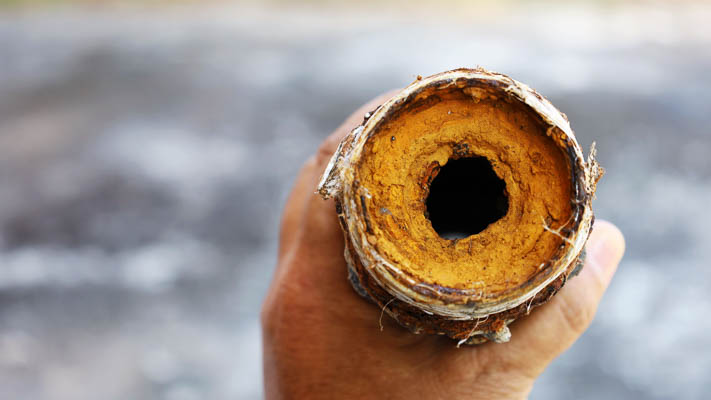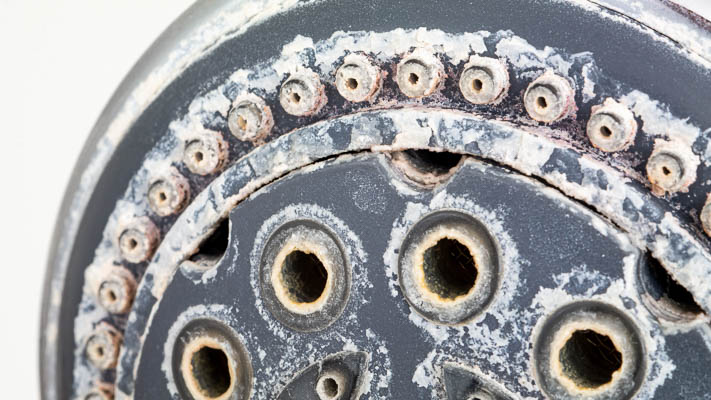Low water pressure in your home can be irritating and disruptive, especially when it's due to a underlying cause like mineral buildup in your water system. Gradually, mineral deposits can gather inside plumbing lines, fittings, and plumbing fixtures, resulting in obstructions and reduced water flow. This in-depth article will explore the factors leading to scale formation, how it reduces water flow, and the best ways to address and prevent it.
How Mineral Buildup Restricts Water Pressure
Scaling in your Raleigh-Durham plumbing system can greatly lower water pressure and cause other plumbing issues. As water moves through your pipe system, minerals such as calcium, magnesium, and iron can deposit on the interior surfaces of the pipes. Over time, these deposits accumulate and develop dense scale layers, narrowing the pipe diameter and creating rough surfaces that catch particles.
This restriction increases resistance to water flow, causing:
- Reduced Water Pressure: Constricted pipes and obstructed fixtures result in less water reaching your sinks and devices.
- Clogged Fixtures: Showerheads and faucets, which contain narrow passageways, can easily get blocked by mineral buildup.
- Damaged Appliances: Dishwashers, washing machines, and water heaters are particularly vulnerable to hard water scaling, diminishing their operational effectiveness and long-term reliability.
If ignored, the accumulation of minerals can result in pipe rusting, leaks, and eventual failure.
What Causes Mineral Buildup in Raleigh-Durham Water Pipes?
Various reasons contribute to the accumulation of minerals in home plumbing systems:
- Hard Water: The most common culprit behind mineral deposits is water high in minerals, which is composed of high levels of mineral content like key minerals such as calcium and magnesium. As mineral-rich water flows through your plumbing, it creates mineral deposits that form layers over time. Hard water is widespread in various locations, making scale formation a frequent challenge for residents.
- Galvanized Pipes: Homes built before the 1980s in Raleigh-Durham may have galvanized steel pipes, which are highly susceptible to mineral deposits. As the outer zinc barrier on the interior of the pipes erodes, the exposed steel or iron undergoes a reaction with water and atmospheric oxygen, causing corrosive damage. This reaction leads to inner pipe scaling, which not only lowers flow rates but also makes the pipe material fragile.

- Copper Pipes: While copper pipes are a durable option, they can also experience mineral buildup. When alkaline water reacts with copper surfaces, mineral particles can adhere to the interior pipe lining. The numerous fittings and angles in copper plumbing systems can make this issue worse, leading to obstructions and even tiny leaks.
- Water Chemistry: The unique blend of chemicals of your water supply can also influence the rate of mineral buildup. Excess iron or manganese content, common in certain regions, can lead to dark mineral stains in your pipes.
Indicators of mineral accumulation in Your Plumbing
When you encounter these problems, hard water deposits could be the cause:
- Lower water pressure: Noticeable in baths, faucets, and additional water fixtures.
- Clogged Fixtures: Overhead showers and tap aerators may be accumulated with chalky or chalky deposits.
- Rust-Colored Water: Suggesting pipe rusting, often connected to old galvanized plumbing.
- Appliances filling slowly: Automatic dishwashers and clothes washers take more time to fill, showing limited water passage.
- Constant fixes: Persistent issues with blockages or issues in your plumbing.
How to Fix Mineral Buildup in Raleigh-Durham Water Pipes

When mineral deposits accumulate in your water pipes, entirely eliminating it is almost unattainable. Here are some solutions to address and prevent the problem:
- Install a Water Softener: A softening system treats hard water by replacing calcium and magnesium ions with alternative ions like sodium or potassium, greatly lowering mineral deposits. While this can prevent future buildup, it cannot eliminate current scale within the plumbing.
- Use a Whole-Home Filtration System: Water filtration solutions can enhance the quality of water by removing minerals and other contaminants. These systems are highly efficient in regions prone to iron or manganese buildup.
- Replace All Pipes With Buildup: If scale has extensively damaged your plumbing, the optimal fix is to conduct pipe replacement. Fixing only affected parts of the plumbing may resolve localized problems, but a entire home plumbing replacement is a better and longer-term fix.
Why Choose PEX Tubing for Repiping?
If you’re upgrading your home’s plumbing, PEX piping is an great solution for avoiding mineral deposits in the future. This is why:
- Smooth inner walls: PEX pipes reduce the adherence of minerals from sticking to the pipe surfaces, minimizing scale buildup.
- Fewer joints and connections: PEX allows for continuous installation, cutting down on connections and bends where scaling is more likely.
- Resistance to corrosion: In contrast to copper and galvanized piping, PEX resists chemical interactions with dissolved water minerals.
- Long-lasting flexibility: PEX can withstand temperature changes and pressure fluctuations, providing extended durability.
Upgrading to PEX tubing can bring back optimal water pressure to your home and ensure a dependable plumbing network for years to come.
Preventing Mineral Buildup in Raleigh-Durham
Preventative measures can assist in preventing the costly consequences of hard water deposits:
- Analyze your water for quality: Frequently check for water hardness and the presence of minerals, especially if you are located in places with water that is naturally hard.
- Add a water softener: Protect your pipes by lowering the mineral concentration of your water supply.
- Perform a water heater flush: Scheduled upkeep stops sediment accumulation from building up in the tank, which can decrease performance and result in scale buildup.
- Have your plumbing system inspected: Regular evaluations by an expert can detect the first signs of buildup or corrosion.
Information about Repipe Specialists in Raleigh-Durham
In cases where mineral accumulation has caused extensive damage to your household pipes, Repipe Specialists can help. With a track record of completing more than 75,000 repipes across the country, they’re specialists in improving water flow and providing reliable plumbing solutions for the future.
Why Choose Repipe Specialists?
- Skilled Whole-Home Repiping Services: Install a completely new plumbing system with long-lasting, advanced materials like high-quality copper or PEX piping.
- Fast and Efficient Service: Most projects are completed in as little as 1-2 days, reducing the impact on your daily life.
- Budget-friendly, Transparent Pricing: Competitive rates and financing options ensure repiping is affordable for all property owners.
- Lifetime Warranty: Enjoy peace of mind knowing your new plumbing system is covered under a lifetime warranty.
Contact Repipe Specialists Today
If you’re dealing with low water pressure as a result of mineral accumulation, take action before it gets worse. Contact Repipe Specialists in Raleigh-Durham to arrange a no-cost consultation and specialized recommendations on repiping your home. Improve your water pressure and preserve your plumbing system with a reliable crew dedicated to providing high-quality solutions.
CONTACT US 24/7
Contact us by phone or email with any questions, or to schedule a no-obligation in-home (or remote) consultation with one of our Estimators.
By Phone
Call (919) 521-4551 to schedule an estimate. If you reach our answering service, please leave a message: we return calls in the order they are received.
By Email
Messages sent using the form on this site, go directly to our email, which we check regularly.
Company & License Information
Repipe Specialists - USA